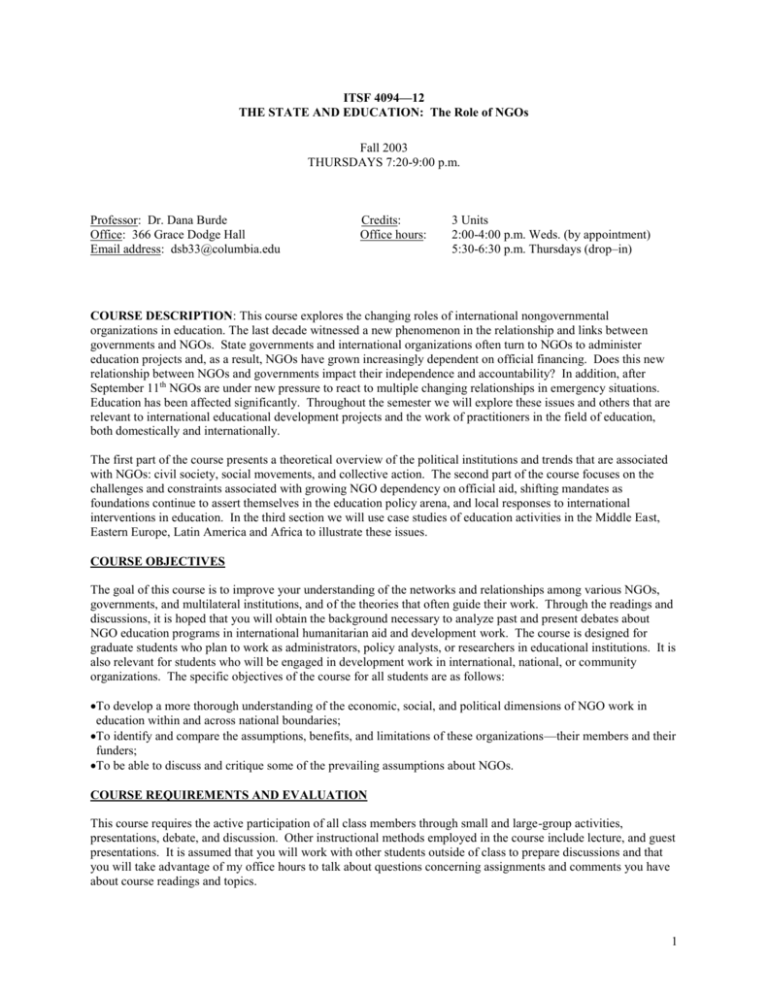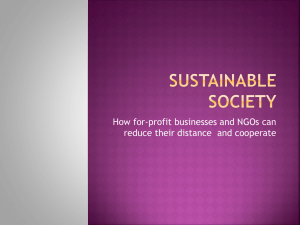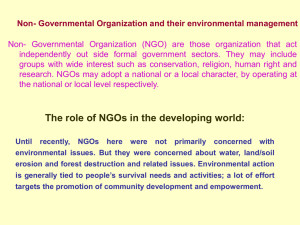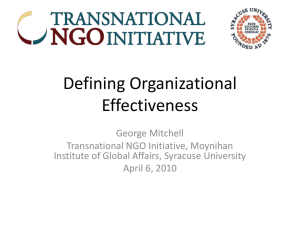Rationale for Summer A Courses, 1999
advertisement

ITSF 4094—12 THE STATE AND EDUCATION: The Role of NGOs Fall 2003 THURSDAYS 7:20-9:00 p.m. Professor: Dr. Dana Burde Office: 366 Grace Dodge Hall Email address: dsb33@columbia.edu Credits: Office hours: 3 Units 2:00-4:00 p.m. Weds. (by appointment) 5:30-6:30 p.m. Thursdays (drop–in) COURSE DESCRIPTION: This course explores the changing roles of international nongovernmental organizations in education. The last decade witnessed a new phenomenon in the relationship and links between governments and NGOs. State governments and international organizations often turn to NGOs to administer education projects and, as a result, NGOs have grown increasingly dependent on official financing. Does this new relationship between NGOs and governments impact their independence and accountability? In addition, after September 11th NGOs are under new pressure to react to multiple changing relationships in emergency situations. Education has been affected significantly. Throughout the semester we will explore these issues and others that are relevant to international educational development projects and the work of practitioners in the field of education, both domestically and internationally. The first part of the course presents a theoretical overview of the political institutions and trends that are associated with NGOs: civil society, social movements, and collective action. The second part of the course focuses on the challenges and constraints associated with growing NGO dependency on official aid, shifting mandates as foundations continue to assert themselves in the education policy arena, and local responses to international interventions in education. In the third section we will use case studies of education activities in the Middle East, Eastern Europe, Latin America and Africa to illustrate these issues. COURSE OBJECTIVES The goal of this course is to improve your understanding of the networks and relationships among various NGOs, governments, and multilateral institutions, and of the theories that often guide their work. Through the readings and discussions, it is hoped that you will obtain the background necessary to analyze past and present debates about NGO education programs in international humanitarian aid and development work. The course is designed for graduate students who plan to work as administrators, policy analysts, or researchers in educational institutions. It is also relevant for students who will be engaged in development work in international, national, or community organizations. The specific objectives of the course for all students are as follows: To develop a more thorough understanding of the economic, social, and political dimensions of NGO work in education within and across national boundaries; To identify and compare the assumptions, benefits, and limitations of these organizations—their members and their funders; To be able to discuss and critique some of the prevailing assumptions about NGOs. COURSE REQUIREMENTS AND EVALUATION This course requires the active participation of all class members through small and large-group activities, presentations, debate, and discussion. Other instructional methods employed in the course include lecture, and guest presentations. It is assumed that you will work with other students outside of class to prepare discussions and that you will take advantage of my office hours to talk about questions concerning assignments and comments you have about course readings and topics. 1 The specific requirements for this course are as follows: 1. Participation 30%: The format will mix lectures and discussions (approximately half of each). You are required to participate in discussions. This means: 1) reading the assignments and participating in class discussions; and 2) choosing a class period within which to present discussion points with a classmate for that week’s readings (first 30 minutes of class). You will submit a response paper for the selection of course readings for that week. Papers will be used in that week’s discussion session. In addition to large- and small-group discussions, we will use ClassWeb as a forum in which to disseminate reactions to and questions about the readings. If you are unfamiliar with ClassWeb, you can attend workshops offered through Computing and Information Services. The schedule of workshops can be found at: http://www.tc.columbia.edu/cis/training/students.htm I will regularly use the email option in ClassWeb to distribute announcements of relevance to the class, so be sure to check that your preferred email address is the one listed for this class. 2. Mid-term Assignment 30%: Write a 5-7page essay on a theoretical question of your choosing from part one of the course. For example: Does social capital matter? Why or why not, and what are the repercussions for education? DUE OCTOBER 16TH. 3. Final Assignment 40%: Final research project 8-10 pages. Choose an NGO case study within which to explore and analyze a question that is useful for your own work or research. For example: How do teacher certification standards affect NGOs implementing education projects in refugee camps in West Africa? DUE DECEMBER 18TH. Criteria for grading written work: Strength and clarity of arguments, quality of analysis, use of sources. PLEASE NOTE: All assignments are due on the date listed in the syllabus. Late assignments will be penalized one point for each day they are late (i.e., one day late from 25 to 24 points; two days late from 25 to 23 points; etc.). Late assignments due to medical or family emergencies will be exempted from penalties on a case by case basis, but there will be no exceptions made as the result of poor planning. Affirmative Action Statement: Teachers College will make reasonable accommodations for persons with documented disabilities. Students are encouraged to contact the Office of Access and Services for Individuals with Disabilities for information about registration (166 Thorndike Hall). Services are available only to students who are registered and submit appropriate documentation. As your professor, I am happy to discuss specific needs with you as well. Course size limit: 20 students. COURSE SCHEDULE AND READINGS The required readings are available on line via the Teacher College E-Reserves. Using e-reserves is significantly less costly than purchasing course packs. It is a new system, however, so I request that you have patience, both with the library staff in organizing the readings, and with yourselves as you adjust to using it (if you have not done so in that past). The required readings that are not located in the TC E-Reserves are available through the Columbia University/TC library website ejournals. You need simply to search for the author’s name under ejournals in order to locate the article. If you have difficulties, please ask the TC library staff, or a classmate to assist you. Because we are studying NGO work in dynamic environments, and because much of international NGO work relates directly to current political changes, I may add readings that will be particularly relevant to the topics that we are studying as the course progresses. This will be the case, for example, for the round table discussion on emergency education in Iraq and Afghanistan on November 13 th. There are two books that you are required to purchase: 2 1. Dichter, T. (2003). Despite good intentions: Why development assistance to the Third World has failed. Amherst, MA: University of Massachusetts Press. 2. Edwards, M. & Gaventa, J. (2001). Global citizen action. Boulder, CO: Lynne Rienner Publishers. These will be available for purchase at the Teachers College Bookstore under ITSF 4094 later in the semester. Course Outline and Readings Week 1 Sept. 4 Introduction: Course overview What are NGOs and how do they relate to civil society, social movements and education? Ginsburg, M. (1998). NGOs: What's in an acronym? Current Issues in Comparative Education [Online], 1(1), 10 paragraphs. Web address: www.tc.columbia.edu/cice/vol01nr1/mbgart1.htm Clark, J. (1991). Setting the scene. Democratizing development: The role of voluntary organizations, (pp. 3-11). West Hartford: Kumarian Press. . PART I: Theoretical Overview Week 2 Sept. 11 Defining NGOs and the Third Sector Salamon, L. (1994). The rise of the nonprofit sector. Foreign Affairs v. 73 (July/Aug. '94) p. 109-22. Available: Ejournals Vakil, A. (1997, December). Confronting the classification problem: Toward a taxonomy of NGOs. World Development 25 (12). pp. 2057-70. Available: Ejournals. Wolch, J. R. (1990). The shadow state: Government and voluntary sector in transition. New York: The Foundation Center. pp. 21-44 Week 3 Sept. 18 Civil Society Putnam, R., with Leonardi, R & Nanetti, R. Y. (1993). Making democracy work: Civic traditions in modern Italy. Princeton: Princeton University Press. Chapters 1, 4-6. Walzer, M. (1998). The concept of civil society, in Toward a global civil society, Walzer, M. ed. pp. 7-27. Foley, M. W. & Edwards, B. (1996) The paradox of civil society. Journal of Democracy 7:3. pp. 3852. Available: Ejournals. Week 4 Sept. 25 Social Movements Keck, M.E. & Sikkink, K. (1998). Transnational advocacy networks in the movement society. In Meyer, D. & Tarrow, S. (eds.) The social movement society, New York: Rowan & Littlefield. Friedman, E. (2000). Unfinished transitions: Women and the gendered development of democracy in Venezuela. University Park, Pennsylvania: Pennsylvania State University Press. pp. 1-52 3 Week 5 Oct. 2 Social Movements and Collective Action Tilly, C. (1997) Social movements as political struggle. Draft article for the Encyclopedia of American Social Movements. And: Tilly, C. (1997) Now where? Draft epilogue to George Steinmetz, ed., State/Culture: New approaches to the state in the social sciences. Ithaca: Cornell University Press. Available: http://www.sociology.columbia.edu/people/index.html?professors/ct135/index.html Tarrow, S. (2001) Transnational Politics: Contention and Institutions in International Politics. American Review of Political Science. 4: 1-20. Website: http://polsci.annualreviews.org/cgi/content/full/1/1/1. Dewees, A. & Klees, S. (1995). Social Movements and the transformation of national policy: Street and working children in Brazil. Comparative Education Review. 39 (1). pp. 76-100 Week 6 Oct. 9 Collective Action and Social Capital – Where Does Education Fit In? Putnam, R. (1995). Bowling alone: America’s declining social capital. Journal of Democracy 6:1 pp. 65-78. Available: Ejournals Edwards, M. (2000). Enthusiasts, tacticians and sceptics: The World Bank, civil society and social capital. Web address: http://www.worldbank.org/poverty/scapital/library/edwards.pdf Bourdieu, P. (1986). The forms of capital. In Richardson, J.G. Handbook of theory and research for the sociology of education. Westport, CT: Greenwood Publishing. pp. 241-25 PART II: NGOs and the State Week 7 Oct. 16 Donor Coordination: Loan agencies, donor agencies and NGOs World Bank NGO Unit. (2000, September) Read the following document posted on the web: Working Together: The World Bank's Partnership with Civil Society Brantley Browning, NGO and Civil Society Unit, SDV. Address: http://WBLN0018.Worldbank.org/Networks/ESSD/icdb.nsf/D4856F112E805DF4852566C9007C27 A6/D0664A00989FBEA785256967006CFF53/$FILE/Working+Together+-+CivilSociety.pdf (Take a moment to look around the site while you're there) Klees, S. (2001). World Bank development policy: A SAP in SWAPs clothing. CICE: Current Issues in Comparative Education, Vol. 3, no 2, Spring 2001. Web address: http://www.tc.columbia.edu/cice/vol103nr2/skart1htm USAID. (2003). New partnerships initiative: NGO empowerment. Web address: http://www.usaid.gov/pubs/npi/corerept/npi-ngo.htm Natsios, A. (June 5, 2002). Remarks to InterAction annual forum. Web address: http://www.usaid.gov/press/spe_test/speeches/2002/sp020605.html MID-TERM ASSIGNMENT DUE 4 Week 8 Oct. 23 Assumptions and Contradictions: NGOs Negotiating New Spaces Edwards, M. & Hulme, D. (1996). Too close for comfort? The impact of official aid on nongovernmental organizations, World Development, 24 (6), 961-973. Available: Ejournals Dichter, T. (2003). Despite good intentions: Why development assistance to the Third World has failed. Amherst, MA: University of Massachusetts Press. Read pp. 1-22, 96-128, 180-296. Steiner-Khamsi, G. (1998). Too far from home? 'Modulitis' and NGOs’ role in transferring prepackaged reform. Current issues in comparative education [Online], 1(1), 10 paragraphs. Web address: www.tc.columbia.edu/cice/vol01nr1/mbgart1.htm Week 9 Oct. 30 The Role of NGOs in Educational Planning McGinn, Noel (1994) The impact of supranational organizations on public education. International Journal Educational Development, Vol. 14, no. 3, pp. 289-298. Kamat, S. (2000) Deconstructing the rhetoric of decentralization: The state in education reform. Current Issues in Comparative Education [Online], 2(2), Web address: www.tc.columbia.edu/cice/vol02nr2/skart1.htm [2000, April 30]. Bray, M. (1999). Control of education: Issues and tensions. In Robert Arnove and Carlos Torres (Eds.) Comparative education: Dialectic of the global and the local. Boston, MA: Rowman and Littlefield. Week 10 Nov. 6 NGOs and State Incapacity: What is "Emergency Education"? Basic policy instruments and framework for education in complex emergencies: Web address: http://www.ginie.org (familiarize yourself with the site). Sinclair, M. (2001) Education in emergencies. UNHCR (go to UNHCR website: http://www.unhcr.ch/cgi-bin/texis/vtx/home and search under “education”) PART III: NGOs and International Education Case Studies Week 11 Nov. 13 Emergency Education: Iraq – The Action of NGOs Roundtable In-Class Discussion Reading TBA Guest Speakers: Steven Bourke, Senior Researcher, and Tom Hill, Program Officer on Iraq, from the Center for International Conflict resolution, Columbia School of Public Affairs Week 12 Nov. 20 Case Studies: Local NGOs and Transnational Movements Mundy, K. & Murphy, L. (February 2001). Transnational advocacy, global civil society? Emerging evidence from the field of education. Comparative Education. 45 (1) pp. 85-126. Available: Ejournals Keck, M. (1995, July). Social equity and environmental politics in Brazil. Lessons from the rubber tappers of Acre. Comparative Politics, 409-424. Kamat, S. (2002). Development hegemony: NGOs and the state in India. 5 Week 13 Nov. 27 THANKSGIVING HOLIDAY – NO CLASS Week 14 Dec. 4 Case Studies: International NGOs and Accountability Gagnon, C. (2000, February). International non-governmental organizations in Bosnia-Herzegovina. In Mendelson, S. E., & Glenn, J. K. eds. Democracy assistance and NGO strategies in postcommunist societies. Carnegie Endowment for Peace. Web address: http://www.ceip.org/files/pdf/GagnonBH.pdf Pralong, S. (2000, February). Civil society and civic education in Romania, 1990 – 1998. In Mendelson, S. E., & Glenn, J. K. eds. Democracy assistance and NGO strategies in post-communist societies. Carnegie Endowment for Peace. Web address: http://www.ceip.org/files/pdf/Pralong.pdf. Szasz, A. (1995). Progress through mischief: The social movement alternative to secondary associations. In Associations and democracy. Cohen, J. & Rogers, J. London: Verso. pp. 148-156. Week 15 Dec. 11 Conclusions Guest Lecture: Michael Edwards, Director, Governance and Civil Society, Ford Foundation Edwards, M. & Gaventa, J. (2001). Global citizen action. Boulder, CO: Lynne Rienner Publishers. FINAL PAPER DUE DECEMBER 18 NO EXCEPTIONS—NO EXTENSIONS Week 16 Dec. 18 FINAL PAPER DUE Guest: Professor Mark Ginsburg, University of Pittsburgh In-Class informal paper presentations. 6









